I. Key messages and update
On Thursday 27 January, England returned to Plan A measures following the huge success of the vaccination programme and falling Omicron infections.
Most of the rules in place under Plan B have ended:
- Work from home guidance has been dropped
- Face masks are no longer compulsory (although some shops have asked customers to keep wearing them and they are required by Transport for London)
- Covid passes are no longer compulsory at venues and events
From Monday 31 January:
In care homes there will be no limit to visitor numbers, self-isolation periods will be cut and rules for managing outbreaks will be eased
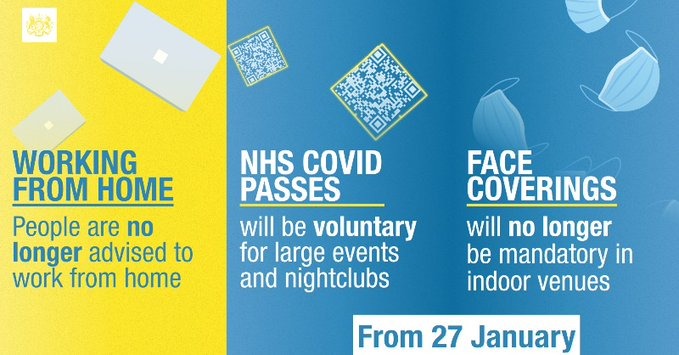
II. Covid Variants and Impact on Health
As the virus reproduces when it infects people and because it uses our own cells to make new viruses it makes some mistakes and this creates new variants of the virus.
The most recent variant Omicron is different from the previous variant because it is more infectious, so spreads more easily between people, and this has led to a rapid increase in case numbers.
So far the average age of people admitted to hospital with Omicron is 45.5yrs, only 30% were aged over 70yrs. The age of people who have died so far from Omicron ranges from 41 to 99yrs.
Omicron is also better at infecting people who have already caught Covid before than previous variants, but having the vaccine reduces this.
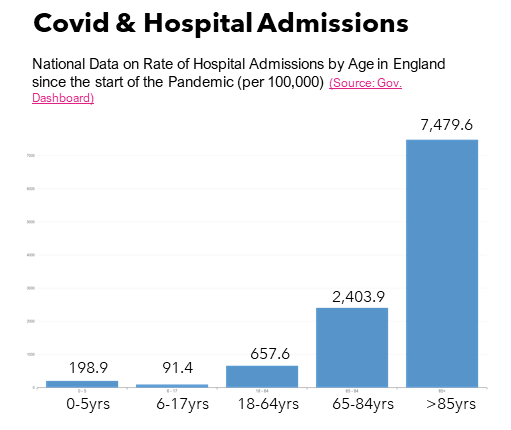
Risk Factors for Severe Illness and Death
The risk factors that increase the likelihood of becoming seriously ill or
dying from Covid are:
- Being unvaccinated
- Older Age
- Being Male
- Being from a non-White British ethnic ethnicity
- Being overweight or obese
- Having a pre-existing and poorly managed health condition like diabetes, high blood pressure, kidney disease
For Chinese people, when adjusted for aged compared to White British people (Jan 2020 to Sept 2021) there was a higher risk of death for Chinese Men but when fully adjusted for deprivation and other factors this was less clear, where as for Chinese Women when adjusted just for age the different was less clear but when fully adjusted it became clearer the rate was higher. (ONS Ethnicity and Death Report)
Long Covid/ Post-Covid Syndrome
- Symptoms last for at least 2 months and are present at least 12 weeks after the Covid infection.
- Common symptoms include fatigue, shortness of breath, cognitive dysfunction but also others and generally have an impact on everyday functioning. Symptoms may also fluctuate or relapse over time.
- Still emerging understanding of this, especially for children. Data from laboratory confirmed Covid cases in the UK suggests 7.5% still have symptoms that limit daily activities at 12 weeks after infection. Continuing symptoms are more prevalent in women, people living in deprived areas and those with an existing health condition or disability, less clear impact of age.
- Vaccination reduces risk of Long Covid and seems to reduce severity.
III. Vaccination
Covid Vaccine Schedule
First dose – start at any time for anyone over the age of 12yrs
Second dose – for people over 18yrs the 2nd dose is 8 weeks after the first dose, for children aged 12-17yrs they have it 12 weeks after the first dose
Booster dose – for adults aged 18yrs and over the booster is 3 months after the 2nd dose
Fourth for specific groups – this is for a small group of patients with weaker immune systems and is 12 weeks after their booster dose, the NHS will contact you if this applies to you.
If you had caught covid and you are due to have a vaccine, for adults you should wait 28 days before having the vaccine, for children this is 12 weeks.
COVID-19 Vaccination for Pregnant Women
- In the UK, all adults including pregnant women are urged to book a COVID-19 booster vaccine (third dose) three months after their second dose – (rcog.org.uk)
- UK Obstetric Surveillance System shows that 96.3% of pregnant women admitted to hospital with COVID-19 between May and October 2021 were unvaccinated
- From 16th December 2021, the JCVI announced that pregnancy women are now considered a ‘vulnerable’ group, emphasising the urgency of them receiving COVID-19 vaccination and booster doses
- If you have COVID-19 in pregnancy, you are twice as likely to have a stillbirth, and it is twice as likely that your baby will be born prematurely
Covid Vaccination Uptake in Chinese Community
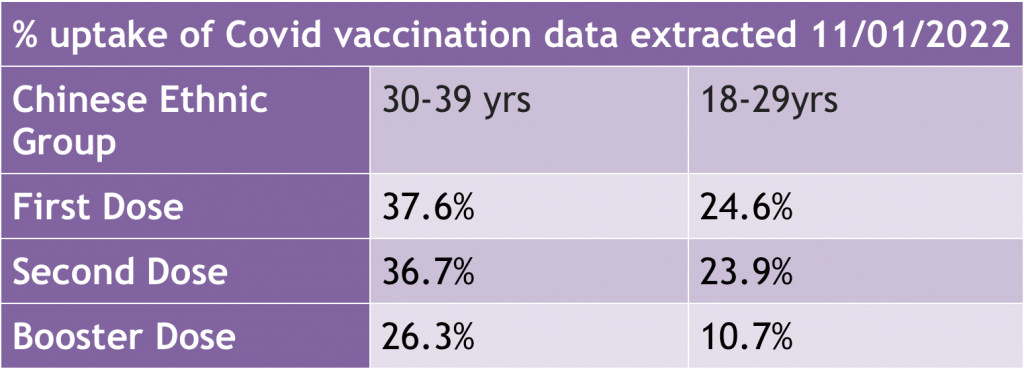
In our Wellbeing Forum on 27/1/2022, Dr Justin Varney expressed strong concern about the low rates of vaccination in the 18-29 and 30-39yrs age groups.
Infection in babies and children in most cases does not lead to severe illness; however, they may transmit the virus to unvaccinated parents who may become seriously ill, and who may in turn pass it on to grandparents who will be at higher risk due to age. Many people in the 18-39 age band will be parents, so Dr Varney urged Chinese people in this age group to get vaccinated.
IV. Reducing Risks
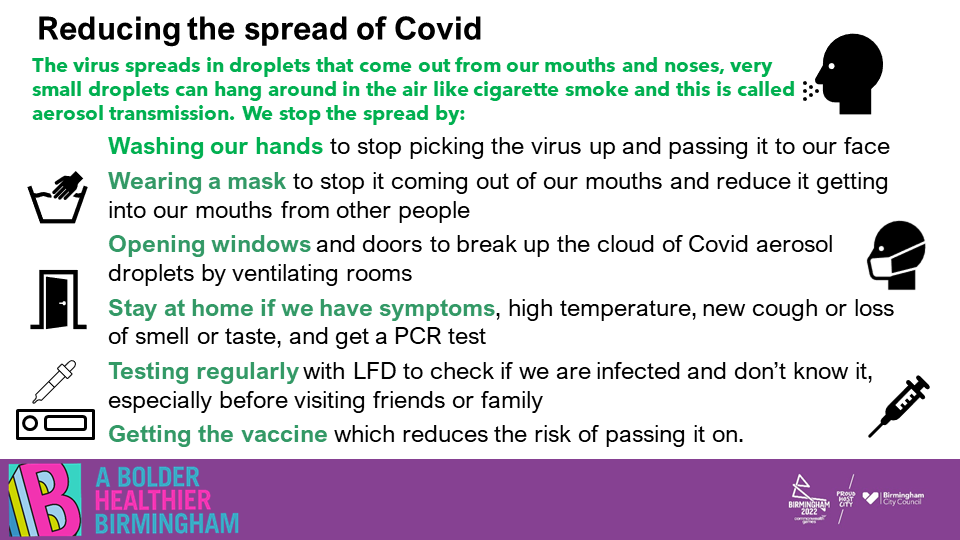
What to do if you test positive
If you test positive, with a LFD or a PCR, then you must isolate.
If you do not have a temperature at day 6 you can then take 2 LFD tests, at least 24hrs apart, and if both are negative then you can end isolation early.
What to do if someone in your house is positive?
Limit time spent sharing space with the positive person, avoid eating together, and wear face masks when in the same room, wash your hands regularly and regularly clean common touch points like door handles and remote controls, open windows regularly to ventilate rooms when they have been in them.
If you do not have symptoms and have had 2 doses of the vaccine, or are under 18yrs old, or cannot have the vaccine for medical reasons, you do not need to isolate but you should do a daily LFD test every day for 7 days before going to work or anywhere you will be in contact with others. Children under 5yrs do not need to test daily but should limit contact with others while Covid is in the home.
________________________________________________
每月疫情更新: 2022年1月31日
1 月 27 日星期四,在加强剂疫苗接种取得巨大成功和奥密克戎感染有所下降之后,英格兰恢复到了防疫A 计划措施。
防疫B计划下的大部分防疫措施已经终止:
• 居家办公的建议已取消
• 佩戴口罩不再是强制性的(一些商店要求顾客继续佩戴口罩,伦敦交通局也要求乘客继续佩戴口罩)
• 进入大型场所和活动的新冠通行证不再是强制性的
从 1 月 31 日星期一开始:
在养老院,访客人数将不受限制,自我隔离期将缩短,疫情管控措施将放宽

II. 新冠病毒变种和对健康的影响
由于病毒在感染人类时会繁殖,并且因为它使用我们自己的细胞来制造新病毒,所以它会在复制过程中出现错误,从而产生病毒的新变种。
最新的变体Omicron奥密克戎与之前的变种不同,因为它更具传染性,因此更容易在人与人之间传播,这导致病例数迅速增加。
到目前为止,因感染奥密克戎入院的人的平均年龄为 45.5 岁,只有 30% 的人年龄在 70 岁以上。到目前为止,从奥密克戎死亡的人的年龄从 41 岁到 99 岁不等。
与以前的变种相比,奥密克戎对已经感染过新冠病毒的人士的传染性相对较低,但接种疫苗可以减少被传染的风险。
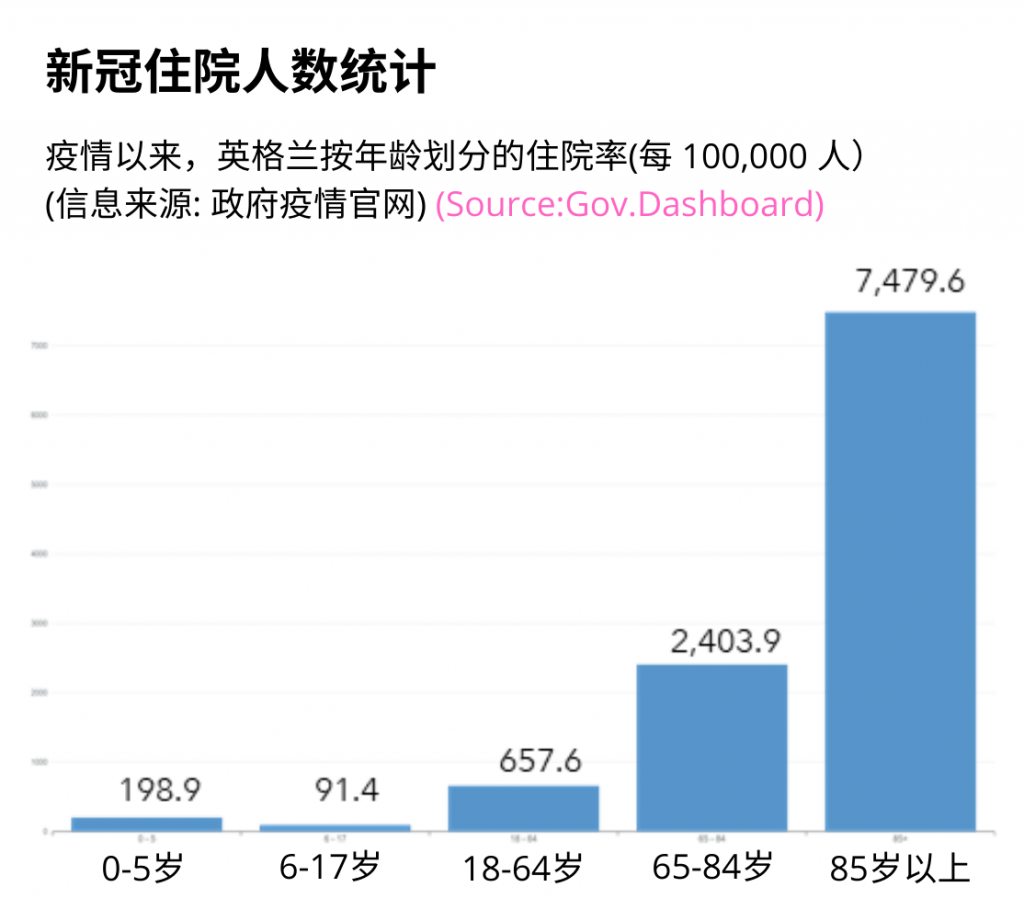
新冠重症和死亡的风险因素
造成新冠重症和新冠死亡的风险因素:
- 未接种疫苗
- 年龄较大的人士
- 男性
- 来自非白人英国种族
- 超重或肥胖
- 患有糖尿病、高血压、肾病等基础病,健康状况不佳
对于中国人来说,按2020 年 1 月至 2021 年 9 月按年龄调整后的统计数据,与英国白人相比,中国男性的死亡风险更高,但在去除其他因素,调整后数据显示,中国男性和英国白人男性死亡风险的差异就不太明显,而对于中国女性来说,仅按年龄调整的数据显示,差异不太明显,但在去除其他因素调整后数据,中国女性和英国白人女性死亡风险的差异变得清晰,中国女性的死亡风险略高。 (国家统计局 种族和死亡报告)
长期新冠症状/ 新冠综合症
- 长期新冠症状是指在新冠感染至少 12 周后,新冠症状仍然持续,并超过至少 2 个月。
- 常见的长期新冠症状包括疲劳、呼吸急促、认知功能障碍,以及其他症状,这些症状通常会影响日常生活。长期新冠症状也可能随着时间的推移而波动或反复。
- 对长期新冠症状的研究一直在继续,尤其是对儿童的影响。来自英国实验室确诊新冠病例的数据表明,在感染后 12 周内,仍有 7.5% 的人出现限制日常活动的症状。长期新冠症状在女性、生活在贫困地区的人士、以及存在健康状况或残疾的人中更为普遍,年龄影响不太明显。
- 接种疫苗可降低感染长期新冠的风险,并且似乎可以降低长期新冠症状的严重程度。
III. 新冠疫苗
新冠疫苗接种时间表
第一剂疫苗 – 任何 12 岁以上的青少年和成人,可以随时开始接种
第二剂疫苗 –18 岁以上的人士,第一剂 的8 周后可以接种第二剂,12-17 岁的青少年,在第一剂的 12 周后接种可以接种第二剂。
加强剂疫苗 –18 岁及以上的成年人士,在第二剂的 3 个月后可以接种加强剂。
第四剂疫苗 – 特定群体 – 针对一部分免疫系统较弱的患者,在加强剂量后 12 周后可以接种NHS 将联系符合条件的人士。
如果您接种新冠疫苗之前,感染了新冠病毒,成年人士应该等待 28 天后接种疫苗,青少年应该等待12周后接种疫苗。
孕妇与接种新冠疫苗
- 在英国,包括孕妇在内的所有成年人都被敦促在第二剂疫苗三个月后预约第三剂加强疫苗 – (rcog.org.uk)
- 英国产科监测系统显示, 2021 年 5 月至 2021 年 10 月期间,96.3%感染新冠并入院的孕妇,都未接种疫苗。
- 从 2021 年 12 月 16 日起,JCVI(英国疫苗接种和免疫联合委员会)宣布孕妇现在被视为“弱势易感”人群,并强调孕妇接种新冠疫苗和加强剂的紧迫性
- 如果您在怀孕期间感染了新冠,死产的机率会增加一倍,而您的宝宝早产的机率也会增加一倍
华人社区的疫苗接种数据

在 2022 年 1 月 27 日中心举办的健康论坛,Justin Varney博士对 18-29 岁和 30-39 岁年龄段的华人低疫苗接种率表示了强烈的关注。
在大多数情况下,婴儿和儿童感染新冠病毒不会导致严重疾病; 但是,儿童可能会将病毒传播给未接种疫苗的父母,这些父母感染可能会导致重症,儿童也有可能将病毒传染给更年长、面临更高风险的祖父母。 许多 18-39 岁年龄段的成年人士将成为父母,因此 Varney 博士敦促这个年龄段的华人尽快接种新冠疫苗。
IV. 降低疫情风险
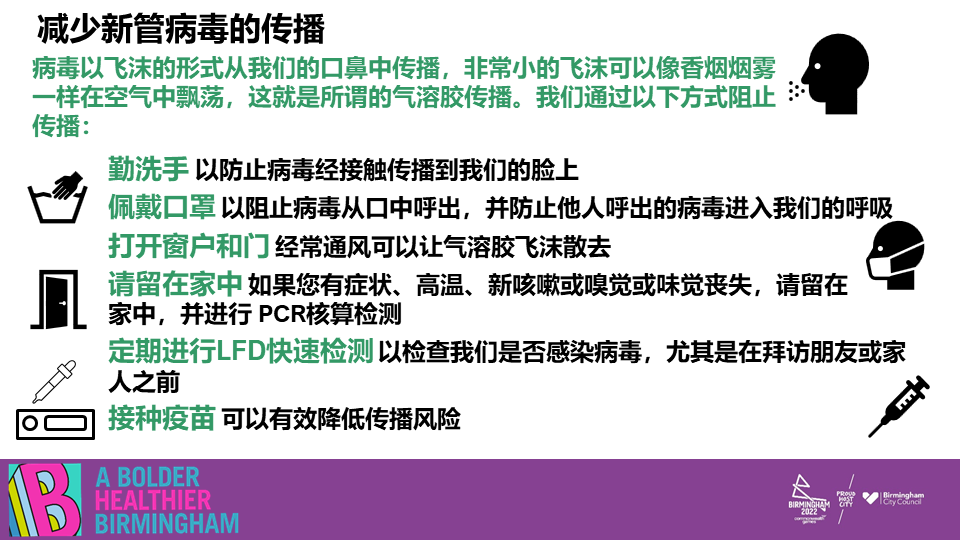
如果您检测呈阳性该怎么办
如果您使用 LFD 或 PCR 检测呈阳性,则必须隔离。
如果您在第 6 天没有体温或其他症状,则可以进行 2 次 LFD 快速检测,两次检测需要至少相隔 24 小时,如果两者均为阴性,则您可以提前结束隔离。
如果您的家人或与您同住的人检测呈阳性该怎么办?
减少与新冠阳性的人士接触的时间,避免一起吃饭,在同一个房间时佩戴口罩,定期洗手并定期清洁常见的接触点,如门把手和遥控器,定期打开窗户为房间通风 。
如果您没有症状并且已经接种了 2 剂疫苗,或未满 18 岁,或因医疗原因无法接种疫苗,您无需隔离。如果您要外出上班或与人会面,您应该在7 天内每天进行 LFD 检测 。 5 岁以下的儿童不需要每天进行测试,但应限制与他人的接触。
__________________________________________
No time to read Covid-19 Monthly Update ebooklet? We have it on audio to read out to you. In Mandarin
没有时间阅读电子月刊?我们用声音播放出来给您听。普通话。
No time to read Covid-19 Monthly Update ebooklet? We have it on audio to read out to you. In Cantonese
沒有時間閱讀電子月刊?我們用聲音播放出來給您聽。廣東話。

